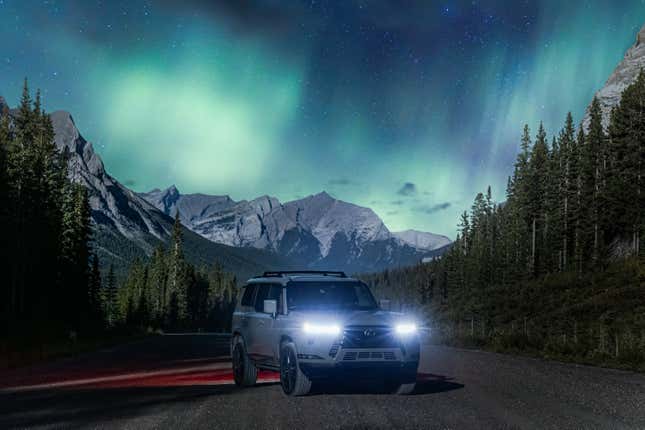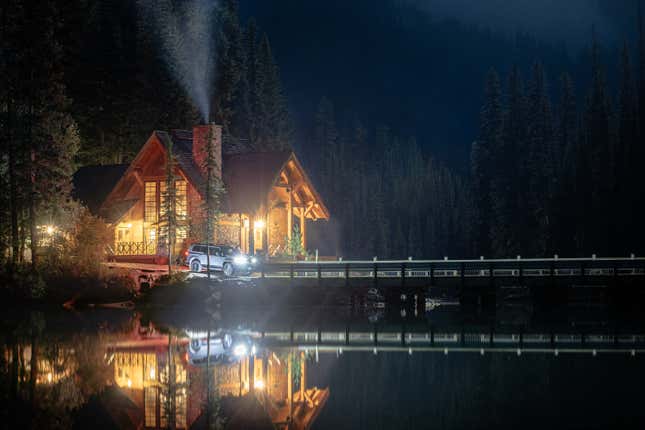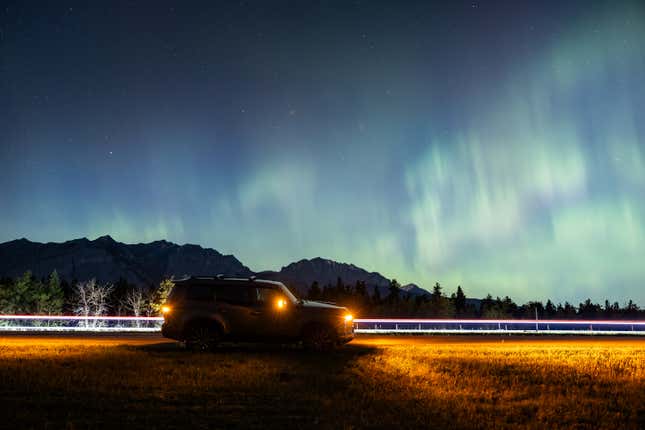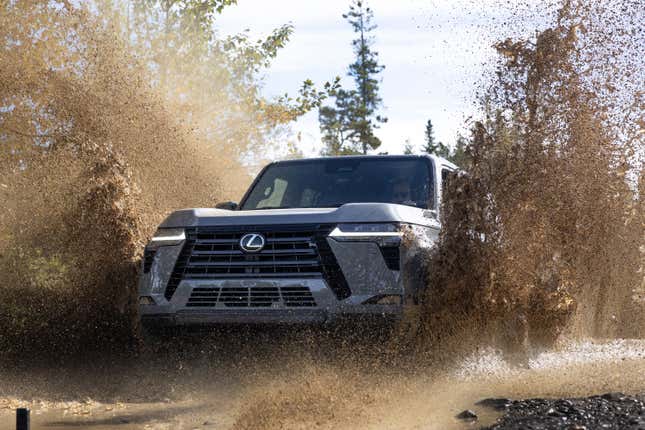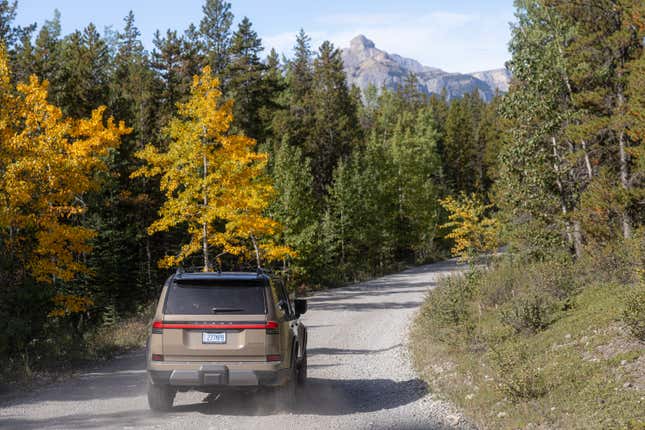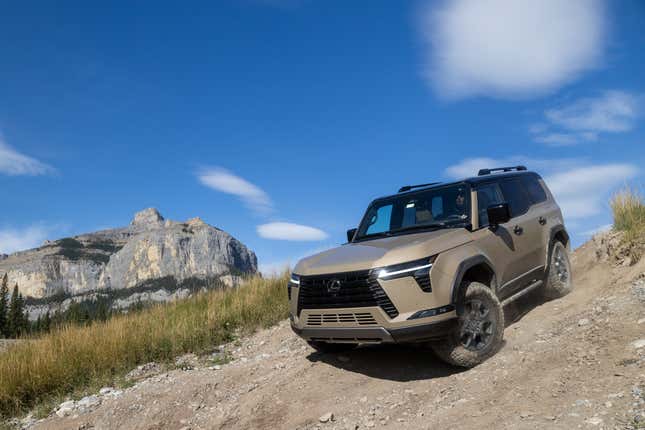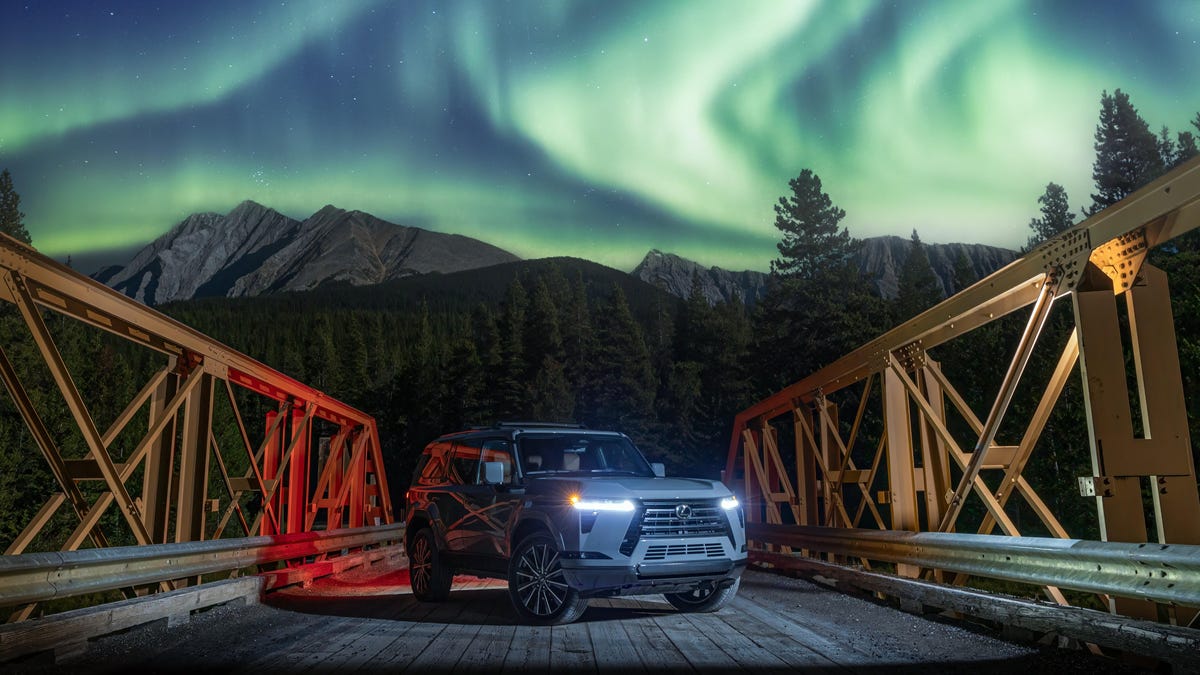My kids — two boys, 3 and 5 — love “magic water paint” books. For the uninitiated, the pages of these books are pre-loaded with a light layer of pigment, indistinguishable from the blank page until swept with a wet brush. Just add water and the pages light up with color, while kids (and probably some less ambitious adults) revel in a tiny bit of discovery.
I have immediate magic water paint deja vu as I hold my iPhone up to the moonlight sky on a bridge over the Vermillion River in Canada’s Kootenay National Park. To my eyes (poor light receptors relative to a modern camera lens), space is filled with star points and what appears to be a wash of milky white clouds. But to the lens on my phone’s camera or, better yet, the telephoto attached to my Canon, the night sky is freaking out.
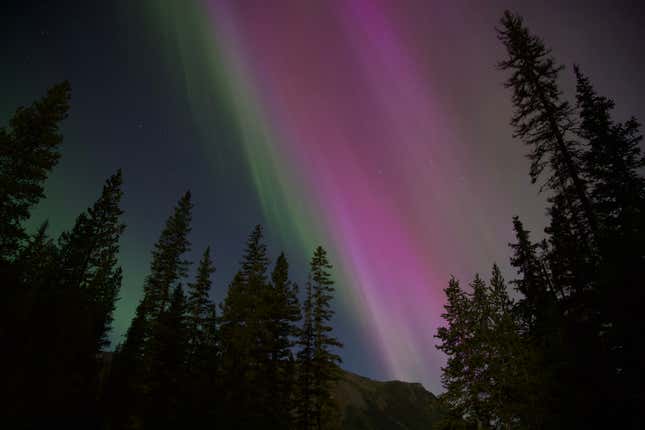
I’ve joined Lexus in the Canadian Rockies, right along the continental divide, to drive the new GX 550 and explore some wild, dark places. The ostensible point of the trip is to visit during the peak season for northern lights when charged particles thrown off by the sun slam into the Earth’s ionosphere and make a pretty mess. Other activities include jumping into a glacier-fed lake before breakfast, hiking, biking, sliding trucks around in the gravel, and glamorously schlepping my muddy gear from spot to spot in a Lexus. What a world.
Full Disclosure: Lexus flew me to Calgary, Alberta, and put me up in a couple of nice hotels with mountain views for the better part of a week. I got to drive the GX 550 all over the Rockies in Alberta and British Columbia, while stopping to eat, hike, and take pictures of the night sky.
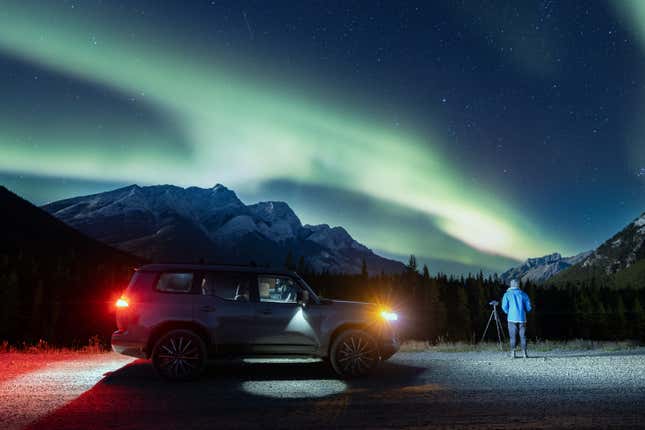
In just about every respect the new GX is a dual-threat vehicle perfect for our week’s prescribed mix of highway driving and off-road-ish recreation. As you’ve maybe already read in Rory’s essay about the new GX 550 vs. his sadly departed GX 470 or Daniel’s almost-glowing first drive review, the new Lexus truck is very good. This is my second go behind the wheel of the GX, and after clocking hundreds of kilometers over five days of driving I can confirm only two reservations about the SUV:
- Over about 60 miles per hour the hood flexes in a way that makes me a little unhappy. Weird, right? But I drove three different GX on the highway this week — two Overtrail models and one in the Luxury trim — and all demonstrated the same flexing hood when driving on the highway. I’m not convinced the wobbly hood means anything is wrong, to be clear, but it’s certainly not a marker of the kind of bulletproof quality that previous Toyota and Lexus off-roaders have enjoyed.
- The base price of the GX 550 is $64,250 including destination, or a jump of about $4,000 from the previous-generation GX 460. Things are more expensive now, I get it. And the only way to get some of what the GX is offering in a new vehicle with similar capability at a significantly lower price would be to find a base model Land Rover Defender. The Landie goes for around $60K in turbo four-cylinder guise, and it obviously has a much dicier reputation for long-term reliability. How does anyone afford anything these days, good god.
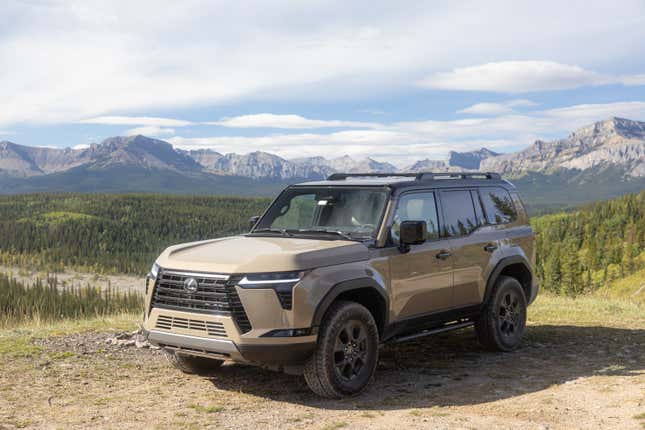
Ignoring the hood and the sticker shock, I find the GX 550 an absolute peach to drive. Canadian limits seem almost painfully slow, but I enjoy frequent forays into super-legal speeds thanks to the punchy twin-turbocharged 3.4-liter V6. With 349 horsepower and 479 pound-feet of torque available, passing pulls from 60 mph to 80-plus are a breeze and I struggle not to rip through the politely obedient Albertan commuters.
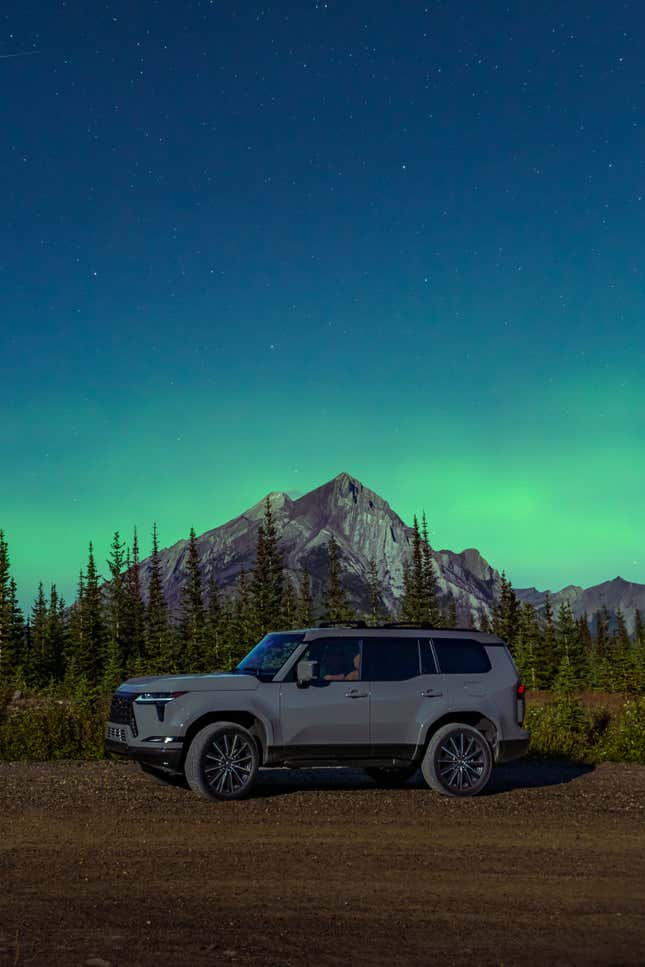
Threats from the Royal Mounted Police (and the Alberta Sheriff Highway Patrol, as the Mounties don’t do Alberta for some reason) to the side, it’s the perfect place to knock around and explore with a big SUV. This area of Western Canada is home to Banff, Jasper, Yoho and the aforementioned Kootenay national parks, with some of the most picturesque landscapes I’ve seen in two decades of traveling. From the early fall through the spring, it’s also a great place to go to look at the sky with a minimum of light pollution.
The goal of this trip is to catch a glimpse of the aurora, and Lexus has planned for an extra-long four-night trip to improve our odds of seeing the northern lights. As it turned out, the trip could have been an extended overnighter, as the solar radiation drifts in our direction on the very first evening out.
To monitor activity, scientists and photographers rely on a measure of space weather conditions called the Planetary K-Index. Here I’m going to have to quote directly from the National Oceanic and Atmospheric Administration to (kinda, half-assed) explain what the index measures:
The K-index quantifies disturbances in the horizontal component of earth’s magnetic field with an integer in the range 0-9 with 1 being calm and 5 or more indicating a geomagnetic storm.
Got it? Me either. But the gist is that, when looking for northern lights, the higher the Kp number the better.
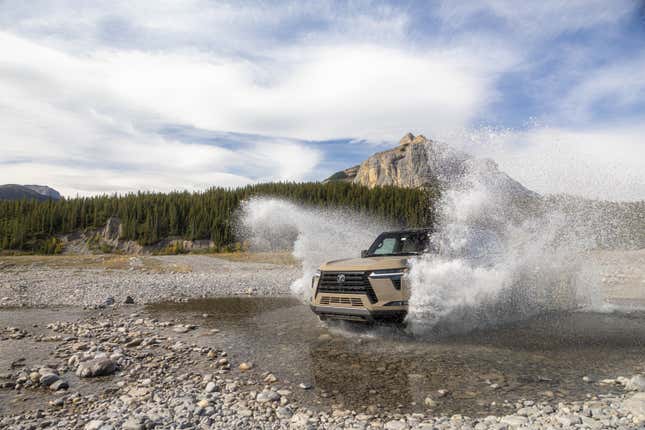
We shortened our welcome dinner after arriving at Lake Louise on the first night in Canada because the local guides/photographers saw Kp numbers jumping off the scale. I am, at heart, a total nerd, so it was easy to get swept up in the excitement around the chase despite jetlag and my general preference to end a press dinner with bourbons.
Arriving at Kootenay just after dusk, I’m surprised at first to find this “dark sky” area of the world isn’t all that dark. As it turns out I’m visiting at the nexus of two rare astronomical phenomena: the very high Kp index plus a massively bright “super moon.” Even as our last reports indicate a Kp value of 7 or even higher, with 9 being the upper limit, it’s clear that the intense moonlight will make seeing aurora with the naked eye somewhat challenging.
For most of the night I’m squinting through a viewfinder at the magic show unfolding above, utterly agog with the small feeling humans get from looking at the sky too long. Standing on a footbridge above the Vermillion River, our group is about as quiet as a dozen people can be. The silence is broken only occasionally with whispered instructions on how to pull focus on a faraway star to better resolve your night sky photo, or a muffled “whoop” when someone catches a new angle on the coronet of white, purple, pink, and green lights in a dome over our heads. It’s the type of thing where you wish everyone you love were there with you to see what you’re seeing.
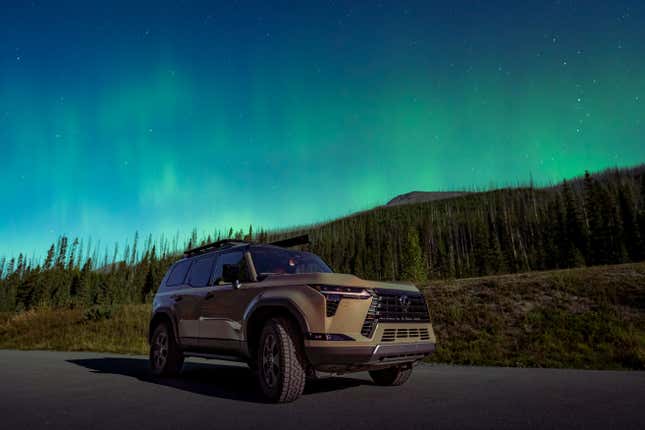
That turns out to be the theme of the week, as we repeatedly wake up early and stay up late to do wonderful shit out in unbelievably beautiful bits of nature. I jumped in the 46-degree glacier-fed waters of Lake Louise (can’t recommend the experience but I can say you’ll get a lot of attention walking back to your hotel room drenched and in slippers). I took an incredible e-bike ride to Moraine Lake where I hiked around and took my selfie next to the hundreds of other beauty-drunk tourists taking their selfies. I got sprayed with mist at Wapta Falls and saw bear scat next to the river, where I collected cool rocks to bring back to the kids.
As a way to get around this part of the Earth, the GX 550 is ideal. Even if you don’t do a day tramping through mud and mostly dried floodplains in the Ghost River Valley, as I did on the final day, the combination of space, accommodations and all-terrain ability just makes adventuring easy. I like a truck that rides and handles like a luxury vehicle but still isn’t so precious that I’m afraid to step in with muddy boots or toss wet bags in the back. All of that is in the GX’s sweet spot.
On that front, I have another quick, very specific driving impression: I spent the most time behind the wheel of a GX 550 equipped with an optional $1,580 Lexus Roof Rack and a Kammok Crosswing retractable awning. The Kammok unit is super easy to use, but I was more impressed with how little wind noise the rack-plus-awning setup generated when driving. Clearly some good aero work is at play here in addition to excellent noise isolation in the cabin. If you like to travel with stuff on your roof, take note.
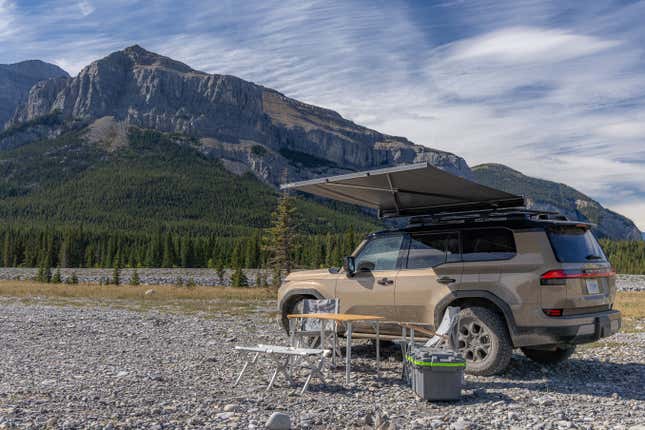
There’s a steep hill in the Ghost River Valley area, clearly used by locals with 4x4s and dirt bikes, that necessitated my putting the GX in low range for the only time on the trip to Canada. The Lexus clambered up the hill —totally left of the correct line I later found out — with a joyful ease. Off the beaten path or during the dead of winter, this is an area of the world where having a true four-wheeler isn’t a bad idea.
Of course, at the end of September with mostly mild weather and clear roads, I could’ve replicated most of Rockies adventure in just about any vehicle with a few inches of ground clearance. The point of the GX, and the reason it’s so easy to recommend despite its jump up in price, is that it’s so pleasing to drive even if you don’t have a thought in your head about going off the pavement. But that added capability, quite a lot of it in fact, provides an amazing confidence boost for pushing your adventures farther and further.
I say this every time I travel but this time I mean it: I’m coming back to Banff. Leuxs or no, I want to bring my family to take a plunge in a lake, hike some of the higher trails, and sit quietly looking at the sky as the sun goes down. There’s some wild magic in this place worth sharing.
